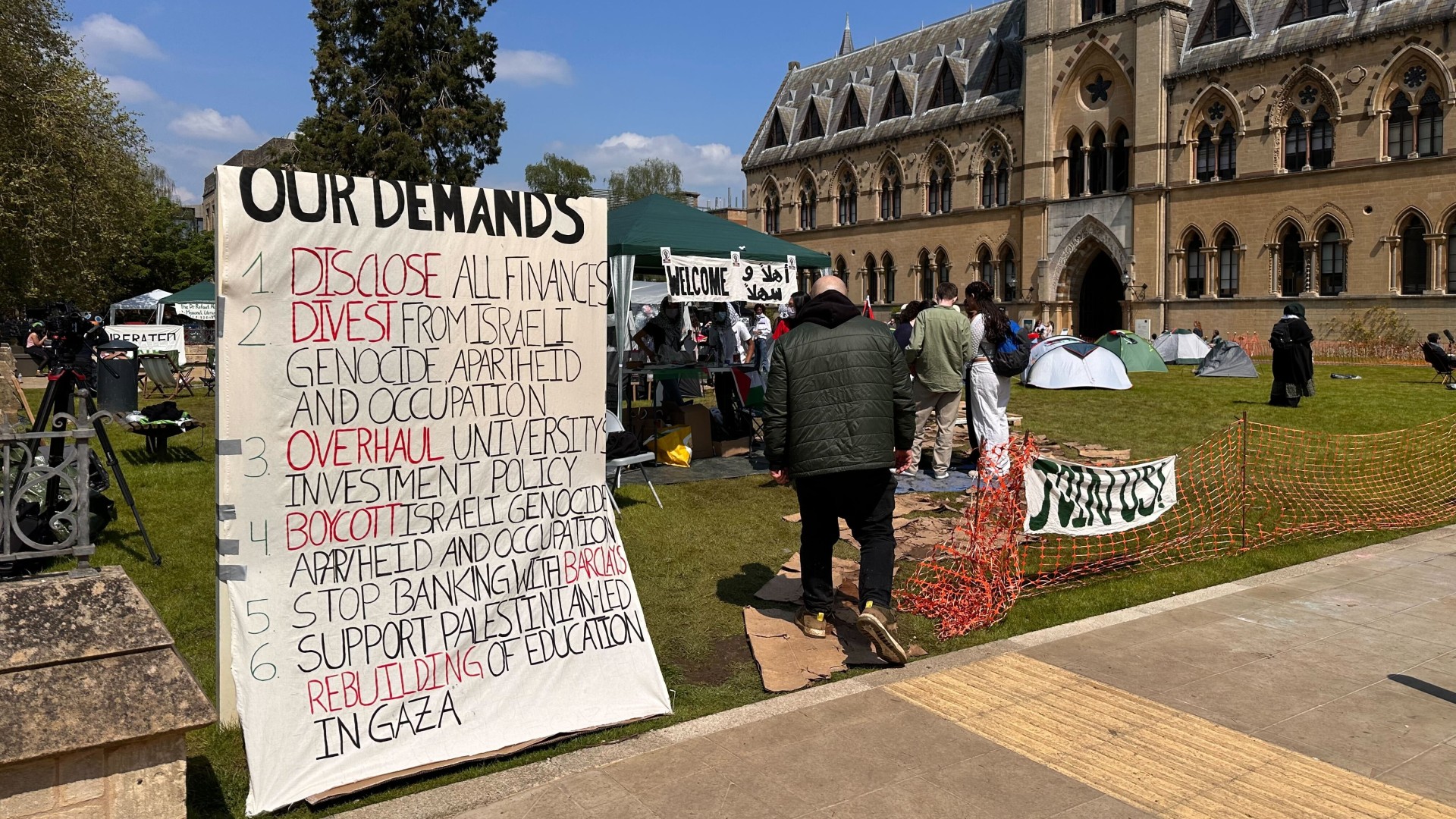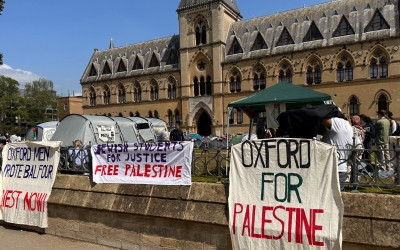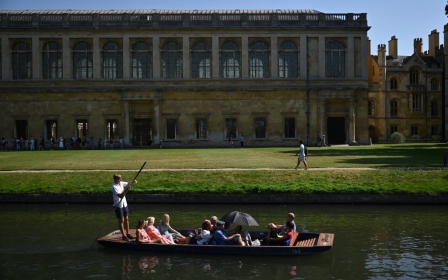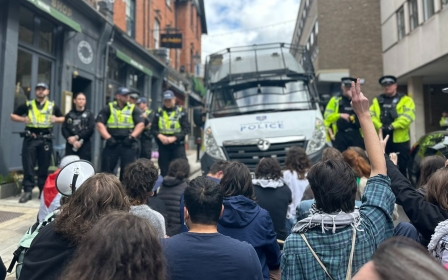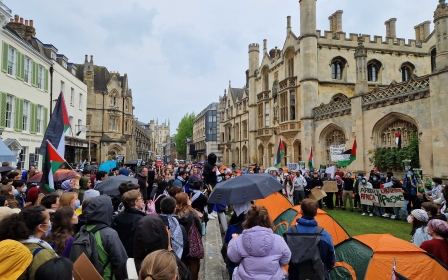Gaza protests: Oxford University students undeterred by violent crackdown
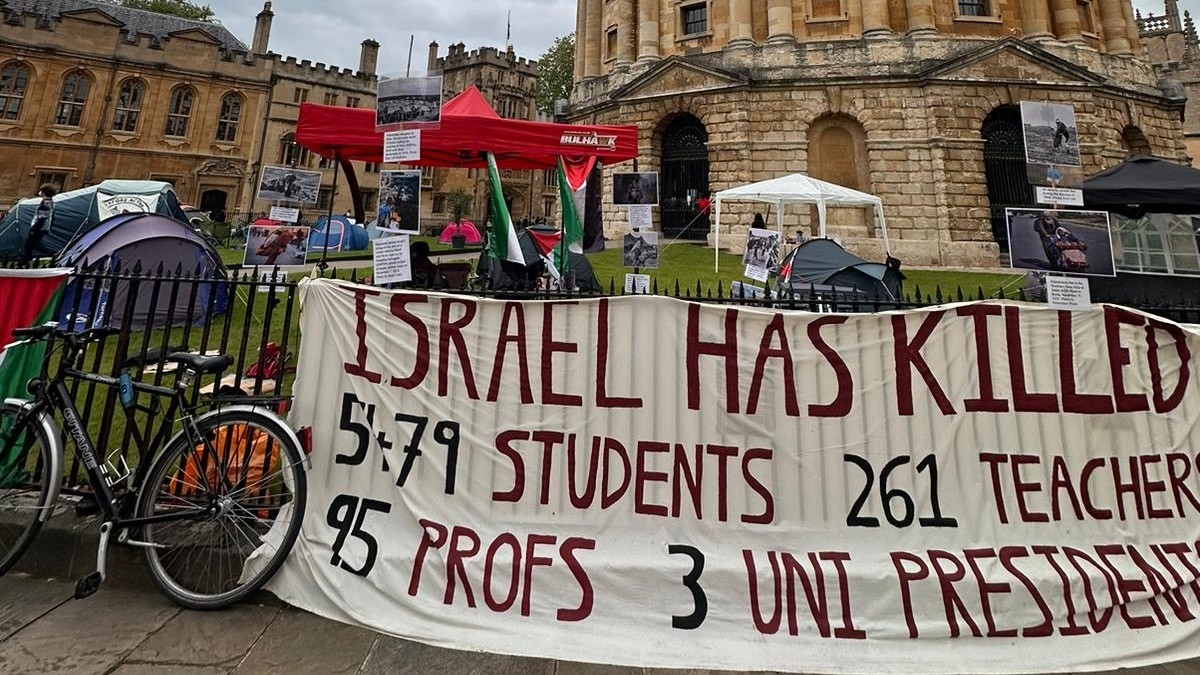
Members of the Oxford University student movement against the Israeli war on Gaza say they are determined to continue their protest action despite the police crackdown this week.
Police detained 17 protesters on Thursday from the headquarters of Vice-Chancellor Irene Tracey in Wallington Square, Oxford, in scenes the activists described as an unprecedented and disproportionate response from the university’s administration.
The university leadership doubled down on the crackdown, saying the students had violated the university’s laws and regulations by occupying part of the administrative building and entering Tracey’s office while she was on a call, “shouting and starting to barricade the doors”.
Oxford students have set up two encampments in solidarity with the Palestinians in Gaza since 6 May: one outside the Pitt Rivers museum and another - set up two weeks later - in front of the iconic Radcliffe Camera building in the centre of Oxford.
Students have a list of demands of the university, including that it end investments in and partnerships with companies and institutions involved in Israel's war on Gaza and Israel's occupation of Palestinian land.
New MEE newsletter: Jerusalem Dispatch
Sign up to get the latest insights and analysis on Israel-Palestine, alongside Turkey Unpacked and other MEE newsletters
For more than three weeks, the university administration has failed to agree to meet with representatives of the student group leading the encampments, the Oxford Action for Palestine (OA4P).
A number of students staged a sit-in at the university’s administrative office in Wallington Square on Thursday as an escalation of their protest action. The building includes the office of Tracey, who was present when the students entered the building and her office.
'Brutalisation'
After a sit-in that lasted approximately 45 minutes, police arrived on the scene at around 8:00 am.
Rowan, a student and member of OA4P, explained to Middle East Eye that police told protesters they would be arrested if they did not leave peacefully.
“When the protesters said 'alright then, we will leave', the police refused to allow them to do so and instead arrested them all,” Rowan said.
“The police engaged in levels of brutalisation completely unlike anything I have ever seen.”
— Middle East Eye (@MiddleEastEye) May 25, 2024
Pro-Palestine protesters spoke to Middle East Eye about the recent sit-in protest on Thursday morning, organised by Oxford Action for Palestine (OA4P), demanding the university… pic.twitter.com/fyoGk1DlPO
Rowan, a student for six years, added that more students arrived at the scene to support their fellow students and prevent their arrest.
“We sat down in front of vans and called repeatedly for the release of our fellow students. In response, the police engaged in levels of brutalisation completely unlike anything else I've ever seen in this city,” they said.
“They shoved us down, they dragged people by their feet, people’s glasses were broken, people were left bleeding, several students have reported feeling concussed,” they added, accusing the university administration of responsibility for the violence.
In a statement, Thames Valley Police said 16 people have been arrested on suspicion of affray and a 17th arrest was made on suspicion of aggravated trespass and affray.
Oxford University news office told MEE that 12 out of the 17 people detained have been confirmed to be current students.
'Muscular response'
Later on Thursday, a letter signed by Oxford University’s senior leadership, including Tracey, accused students of using “direct action tactics” that required a police response.
In an email sent to students and staff, seen by MEE, the university accused student protesters of making “inaccurate statements and claims” about the institution, and “forcibly overpowering” the receptionist at a section of the university offices in Wellington Square.
Students, however, denied the accusation, saying CCTV footage reviewed by lawyers proved that students entered the building peacefully.
“This CCTV footage provided by the university has already been reviewed by solicitors, who said that there is no evidence whatsoever that supports the university’s framing for this and indeed any legal consequences for this incident," said Rowan.
Over a dozen students were arrested at Oxford University on Thursday, after police cracked down on a protest in solidarity with Palestinians in Gaza.
— Middle East Eye (@MiddleEastEye) May 23, 2024
For the past two weeks, Oxford students have launched protests and an encampment, demanding the university end investments in and… pic.twitter.com/4ssWJfhr3M
All detained students were released on Thursday night, a member of the OA4P told MEE. No official charges have been brought against them yet. Thames Valley Police said the 17 people have been released on conditional bail.
“The vice-chancellor and senior leadership have refused to meet members of the OA4P,” said Rowan. “Their primary form of response has been through these public statements through which they seek to persuade their student body that we represent a danger rather than members of the university who are seeking to help create a university of which we are proud.”
MEE has contacted the vice-chancellor's office for comment but had not received a response by the time of publication.
Members of the OA4P say they have support from a significant number of students and staff. More than 10 percent of the student population have expressed their support for the demands of the encampments, while 600 faculty members have also added their names to a public letter listing the students' demands, Rowan said.
Mohamed-Salah Omri, professor of Arabic and comparative literature, said the crackdown was unprecedented in the UK.
“Oxford is the first university in the UK to make this muscular response,” he told MEE, speaking from the Pitt Rivers museum encampment.
“It is pretty appalling and sets a standard. For it to come from Oxford in particular is going to have repercussions not only for the reputation of the university but also the atmosphere among students and staff.”
In recent weeks, students at several UK universities, including UCL, the University of Manchester and the University of Warwick, have launched tent encampments to demand divestment from Israel.
MEE revealed earlier this month that Trinity College, the University of Cambridge's wealthiest college, voted to divest from all arms companies. But the college decided not to announce it publicly after an activist defaced a portrait inside Trinity of Lord Arthur Balfour.
The encampments in the UK come after violent crackdowns on pro-Palestine solidarity movements at campuses across the United States.
Demands to disclose investments
The University of Oxford Gazette on Thursday published a response by the governing council to questions by two professors asking what obstacles, if any, prevented the university from asking Oxford University Endowment Management (OUEM) to “publicly disclose detail of all its direct and indirect investments, including any in arms, aircraft, weapons, or other instruments of war”.
At the heart of the demands of the Oxford encampment is the disclosure of the finances and investments of the OUEM.
The university council said in its response that the Oxford University Investment Policy Statement (IPS) “prohibits direct investments in companies manufacturing arms that are illegal under UK law, as well as indirect investment in funds which invest primarily in such companies”.
It added that OUEM may not be able to disclose indirect investments in third-party companies because it has to abide by confidentiality agreements related to third parties.
The university council, however, confirmed that “there is no exposure directly or indirectly to arms that are illegal under UK law”.
Students have not been satisfied with the response, however.
“The reference to ‘Arms illegal under UK law’ is a precise definition which does not encompass for example Israeli quadcopters and various ways through which arms and financial corporations participate in the maintenance of that war machine,” said Rowan.
Attacks on encampments
In its email statement, the university leadership said that it had declined to take part in negotiations with the OA4P because the students had preconditions, including progress towards their six demands and threats of escalation for non-compliance.
The statement described the preconditions as “prejudicial” and accused the OA4P of not being transparent about their membership or the interests they represent.
The statement went on to suggest that some protesters had caused the intimidation of the Jewish community on campus.
'People who were not on our side before are on our side now'
- Amy, DPhil student
“It is clear that the actions of some of the protesters involved in the encampment have created a deeply intimidating environment for many members of our community, including our Jewish students and staff and members of the local Jewish community,” it said.
However, the students rejected the accusation, saying that the encampments, which have a large Jewish presence, have been at the receiving end of anti-Jewish attacks.
Rowan, the OA4P member, said that the Pitts Rivers encampment was attacked last week by six men who jumped out of a van and began threatening to kill all protesters.
“They shouted slurs at us, and particularly acted with vile vulgarity towards the visibly Jewish members of the encampment,” they told MEE.
At the time, the university released a statement saying it was "concerned by the incident."
"Our key priority throughout this protest has been the safety and welfare of the whole University community, as well as visitors to our buildings and the public," the university statement dated 13 May, shared with MEE, read. "We are maintaining an increased security presence around the encampment to ensure the safety and welfare of everybody, while also providing regular protection across the rest of the University."
A few days later, a man with a knife slashed at a banner that held the six demands of the encampment, Rowan said.
“The vice-chancellor repeatedly claims that our protest is making Jewish students feel unsafe while giving no regard to the very real lack of safety being experienced by all of those in the encampment, but particularly our most marginalised members.”
Amy, a DPhil student, said the crackdown on Thursday had made the OA4P stronger.
“People who were not on our side before are on our side now because they understand that the way the university treated its own students yesterday is completely unacceptable,” she told MEE.
Middle East Eye delivers independent and unrivalled coverage and analysis of the Middle East, North Africa and beyond. To learn more about republishing this content and the associated fees, please fill out this form. More about MEE can be found here.


